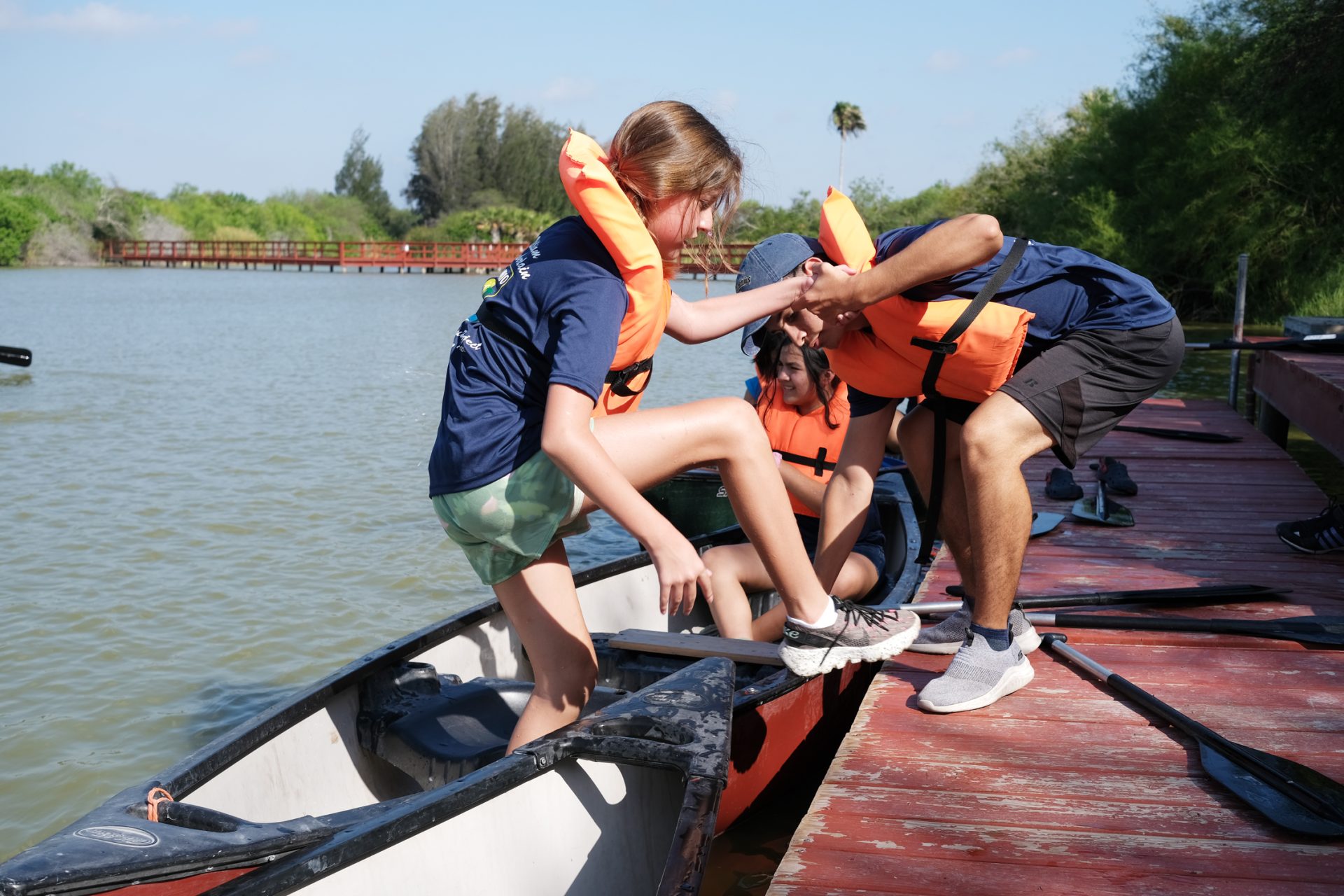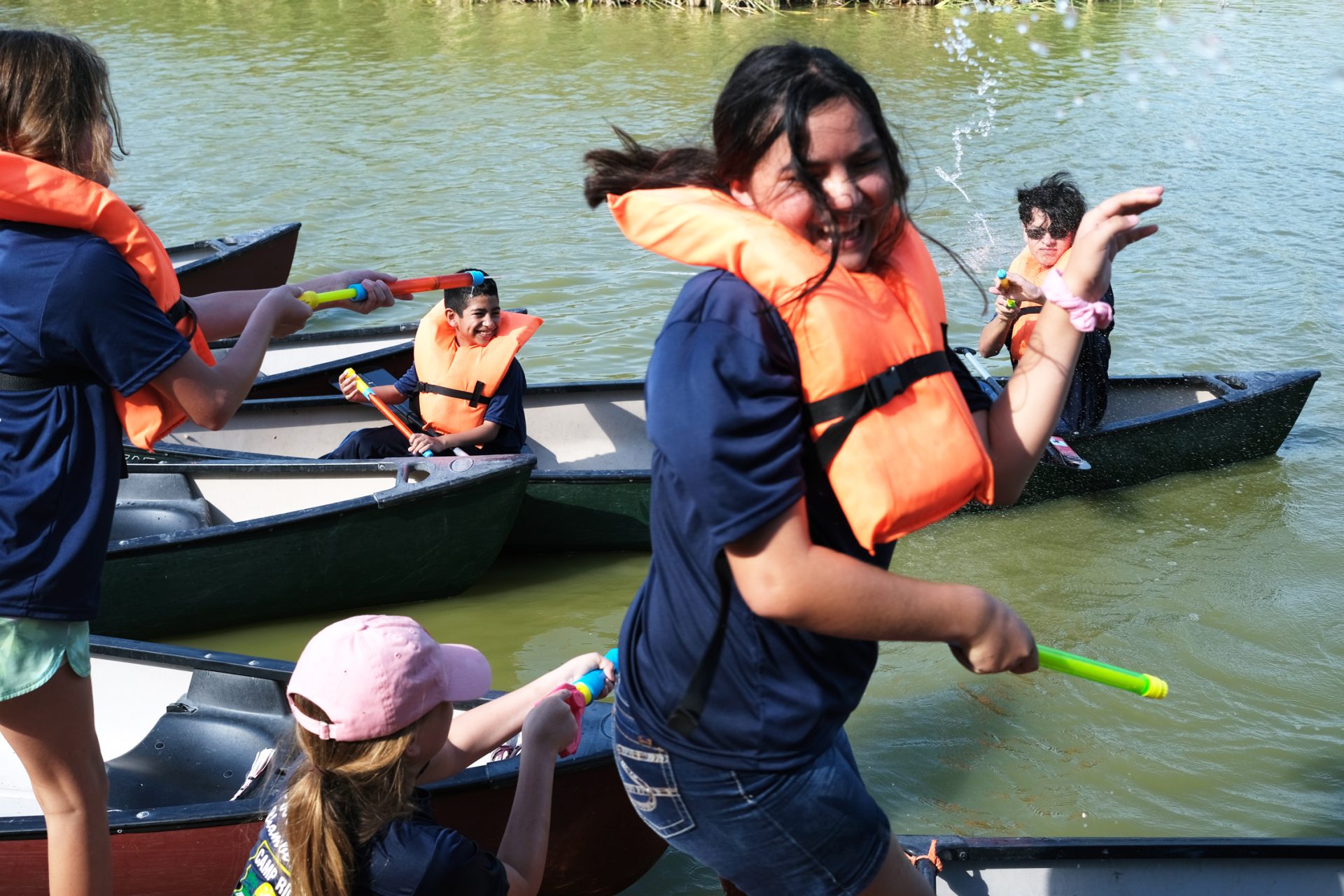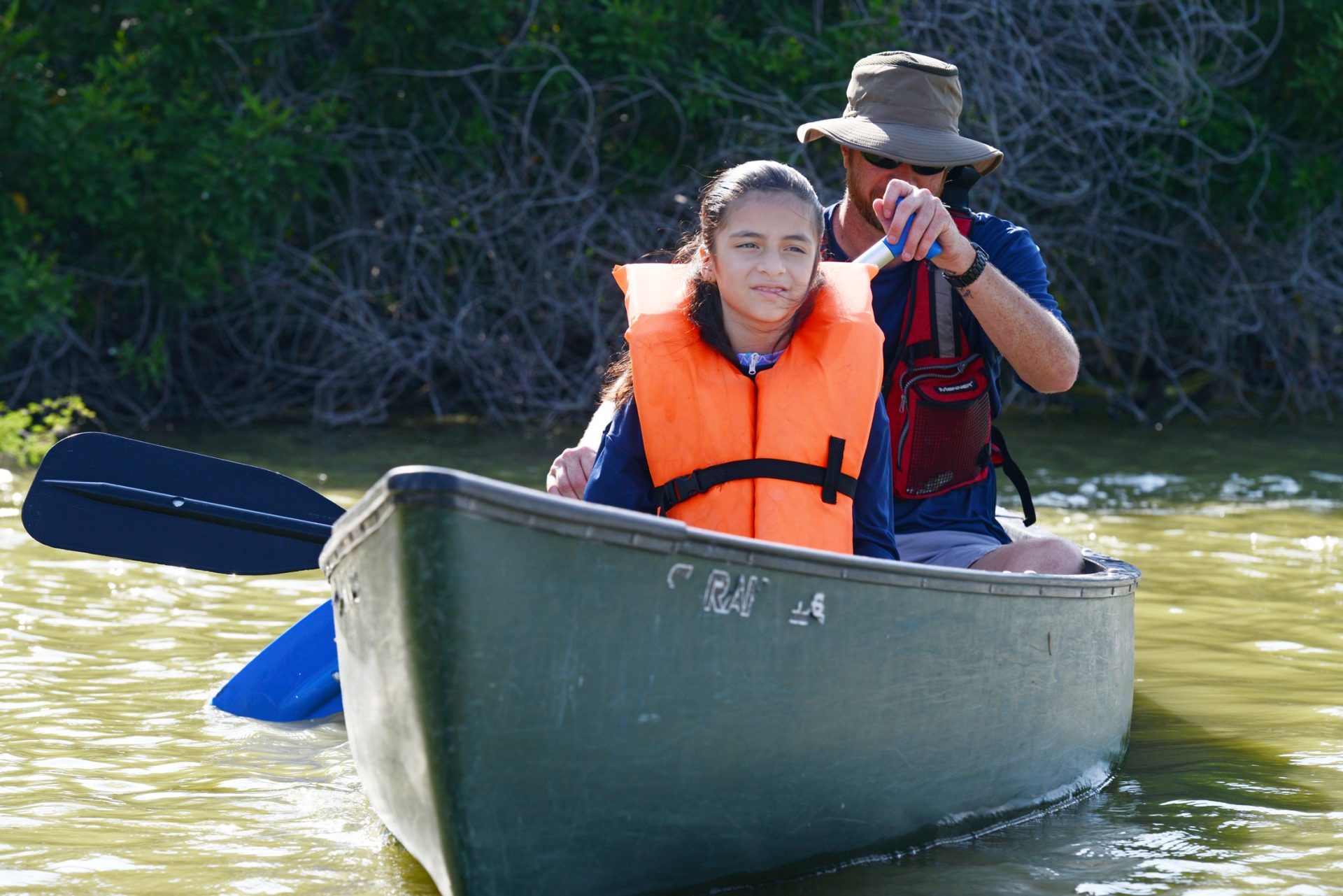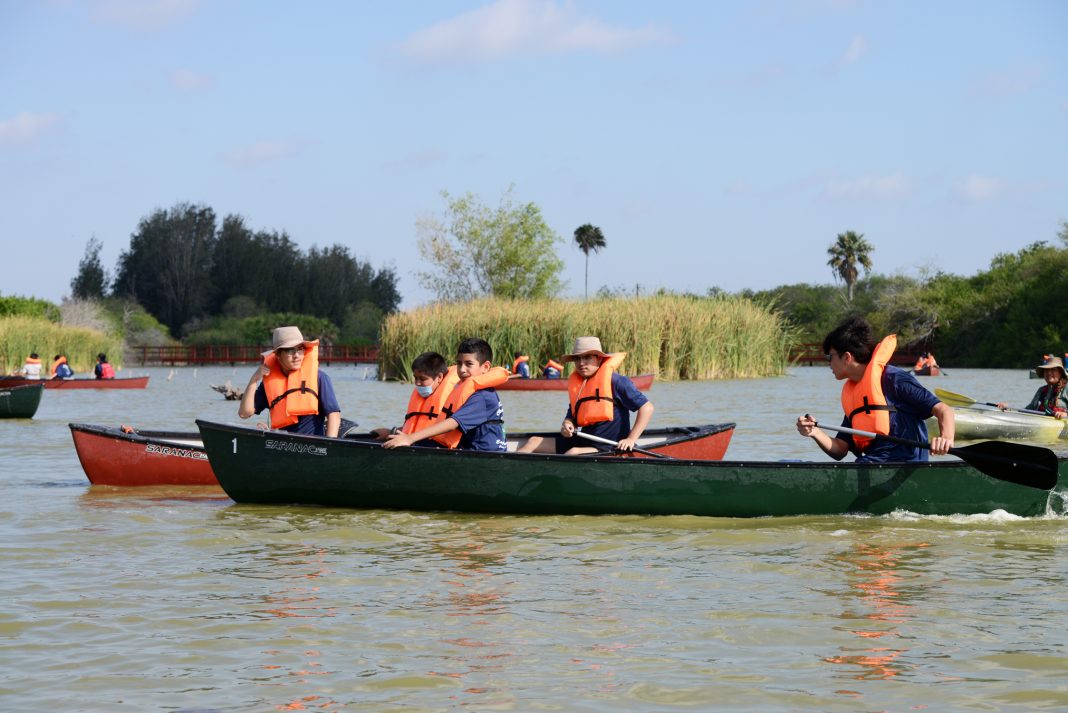BROWNSVILLE — Sunshine shimmered off Camp RIO’s shallow resaca Friday as children paddled canoes filling the air with sounds of splashing and laughter — but while some see a typical portrait of a summer pastime, families witnessed small miracles unfold in the span of a week.
Sitting by a floating dock near the edge of the resaca, Rocio Calderon Soto, 47, watched as children, including her 12-year-old, Osiel, and 9 year-old, Noah, float on narrow boats over the inviting verdant waters. Each child was partnered with a volunteer, many of whom were friendly Boy Scouts and Girl Scouts.
“These are the kinds of things that we don’t ever think, ‘When is this going to happen?’ We kind of think, ‘Nah. This is never going to happen,’” Rocio said.
Rocio admits she, like many parents of children with autism, encounter apathy frequently enough to expect it as the rule when treating kids with developmental needs.
“But then somebody knocks on your door and it’s a stranger who doesn’t want anything in return, just really wants to be part of this and really get to know our kids. We start to think, ‘there’s a possibility. There are people out there who really care and see my child as a person, as a kid,’” she reflected with a steady gaze upon Osiel and Noah.
The stranger at the door was William Chamberlain, a 17-year-old who developed the idea as a way to achieve Eagle status, the highest ranking milestone in the Boy Scouts.
“It’s been a long process. All June we’ve been planning,” William explained. “I didn’t know what to expect at first.”
William is the son of Steve Chamberlain and Sylvia Chamberlain, both special education educators. Together they created the Buddy Summer Camp Eagle project that started with a GoFundMe page to cover expenses for 11 children. The page fell short of its target but not of its goal.

Fellow Boy Scouts and some of William’s friends joined the project to volunteer as a buddy, but when they didn’t have enough people they reached out to the Girl Scouts who, in line with their “do a good turn daily” motto, responded quickly and filled out the rest of the empty slots.
“By having both, I think it’s really made the dynamics powerful,” Steve Chamberlain said.
Still, he worried about the challenges young volunteers may face without enough supporting staff trained to understand and aid children with autism. That’s when parents Rocio Calderon Soto, Susy Perez and Aida Garcia, who are involved in teaching parents evidence-based methods for helping kids with autism, along with Jason Shiplett and Camp RIO staff stepped in to chaperone the group.
It looked promising to Camp RIO lead guide Elizabeth Baez.
“They are kind of around the same age group,” Baez said. “What I’ve noticed is that they’re more willing to play around or ride around with them, because they think of them as friends, instead of teachers.”
Yet, the first days were like navigating choppy waters, William recalled.
“It’s different because they act differently. They may throw a tantrum. They may not react well to changes throughout the day,” William said Friday. “So, we’ve been trying to make the schedule flexible for the kids. It’s not perfect, but they’ve been transitioning very well.”
Before they began camp on Monday, the children, including Romina Garcia, 9, met with their buddies. Zarah Rendon, 12, was matched with Romina, who has autism and is nonverbal, though she understands Spanish.
“I know a little bit of Spanish, so I got teamed up with her. And, we’ve just been hanging out with each other,” Zarah said.
Romina’s mother, Aida Garcia, 43, noticed the instant connection.
Zarah took Romina’s hand and they took off running that first day. They had to sit them down because they kept running, hugging each other and playing, Aida said through a smile.
Romina loves to run competitively and play with her siblings, but she came with an additional challenge. Romina has a long fear of water, her mother said.
It’s a paralyzing fear that, at one point, stopped Romina and Aida from crossing a bridge over a resaca during a race. “I just couldn’t move her,” Aida recalled. “It was impossible to get her close to the water.” They made another route to continue the race, but the moment cemented the phobia in Aida’s mind.

For a summer camp full of water-based activities, the challenge was considerable.
But on Wednesday, as Aida drove away from the camp, Susy Perez, another parent, recorded a video that forced her to pull over.
Romina was sitting by the pool, dangling her feet and playing with her buddy, Zarah.
On the side of the road, Aida at first thought there was a mistake.
She pinched the video and zoomed to the girl by the pool. To her surprise, it was Romina. Tears streamed down her face as she called her husband.
“What we couldn’t accomplish in nine long years, they were able to do in two days,” Aida said.
Skeptics of the strategy of pairing young, inexperienced volunteers with autistic children were converted after realizing the potency of true affection on children rarely shown comprehension and friendship.
“The little girl, Zarah, saw Romina, not the autism,” Aida said.
After that day, Romina set out her bathing suit eager for the next morning at camp.
“It’s something that I have no way of being able to thank or pay back, because my daughter, Romina, is happy,” her mother said.
Susy Perez who filmed the video documented a shift in her own son’s behavior.
Mason, a 9-year-old, struggles understanding the concept of time.
“Let’s say that he’s here and he’s very frustrated. Like, ‘When does this end? Do I get to go home? When does this activity end?’” Susy said, explaining common questions that arise in her child’s mind.
Volunteers and staff came up with a method to help Mason.
“We’re learning that he’s working really well with a timer. So, we’re like, ‘Okay. This activity is going to last 20 minutes.’ We put it on a timer,” Susy said. “And he’ll say, ‘Oh. Twenty minutes. That’s easy!’”
It’s the kind of proof craved by parents often reminded of what their children can’t do.
“These are things that I take to school whenever I meet with the teachers, and I have documentation now. I have pictures. I have videos of him showing he can do things. ‘Why are you telling me he can’t do things?’” Susy said, imagining the naysayers.
For others, it was the subtle, unteachable lessons that made them swell with pride.
Rocio’s sons, Osiel and Noah, have intellectual disabilities with comprehension levels years under their physical age. They’re often underestimated and pitied.
“Pity is the worst thing,” Rocio said.

Noah, 9, doesn’t speak much, and Rocio thought he was not bonding with his buddy, Autumn. That changed when Autumn was absent on Friday, and Noah protested a new assigned friend.
“So, did they make a connection? Absolutely. I wanted to cry when he said that. I was like, ‘Oh my God! Yes. It happened. He knows what’s going on,” Rocio said. “We wonder about that.”
Visual aids, sensory breaks, accommodating schedules are all useful resources but were no substitute for the benefits of experiencing friendship.
“This is a way to teach that, and that concept is not an easy thing to teach,” Rocio said as she watched one of her sons paddle a canoe.
“Look at that! He even knows how to go backwards,” Rocio pointed out. “Never in my life would I think this kid was going to know – not just get on the boat, but be part of a team, move the boat this way and move the boat together without me being there.”
Rocio beamed with pride.
Volunteers like Zarah shared in the joy brought on by their buddy’s accomplishments.
Her favorite part of the week was seeing Romina swim, she said.
For volunteer Nicholad Shiplett, 13, these are lifelong lessons that changed them, too.
“I know people with disabilities, and they want to be treated like normal people,” Nicholad said. “They love a lot of stuff, and it’s good that they’re trying a lot of stuff, too.”
But even in the failures, there was opportunity for solidarity, even happiness.
“‘I feel like I failed,’ a volunteer said, because he couldn’t get him to do something,” Rocio said she overheard one day. “My heart went out to him, because I feel like that every day. But to hear somebody say that … they care.”





